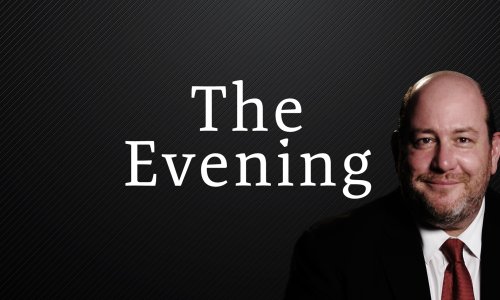The Evening: 8 Million Cases, Relief Talks, How Do You Sleep and More

8 Million Cases
As coronavirus cases across the United States climb toward a third peak, the country surpassed a total of 8 million total known cases this afternoon, as the NYT reports.
Relief Talks
House Speaker Nancy Pelosi (D-CA) and Treasury Secretary Steven Mnuchin cited progress today in their ongoing coronavirus-relief negotiations less than three weeks before the November elections, though the Democratic leader raised concerns about whether any big spending package could pass Congress given fierce resistance in the GOP-controlled Senate. Pelosi and Mnuchin have been discussing a new spending deal between $1.8 trillion and $2.2 trillion, though President Trump has said he would support even more, as the Washington Post reports.
Increased Risk
Secretary of State Mike Pompeo today said Turkey’s involvement in the conflict between Azerbaijan and Armenia has increased the risk in the region, reiterating his call for the issue to be resolved through diplomacy, as Reuters reports.
Climate Check
"[I]t is clear that stimulus needs to play a role in either making the case for further climate action, or at least creating the stable political and economic environment for large-scale reforms," writes CSIS's Lachlan Carey in a new commentary.
CSIS Executive Education
Apply today to Understanding Washington, a virtual course designed to give business leaders, embassy officials, and nonprofit professionals the tools to master Washington’s complex policy ecosystem. Led by top CSIS experts and veteran Washington insiders, participants will hone their ability to engage key players, navigate crises, and assess breaking developments.
Video Shorts
Check out CSIS’s new series of video shorts: “Testify,” "What's Happening," "Preview," and “High Resolution.” And don’t forget to subscribe to the CSIS YouTube Channel!
In That Number
8 Million
The number of people falling into poverty has grown by 8 million since May, according to researchers at Columbia University, after falling by 4 million at the pandemic’s start as a result of an $2 trillion emergency package known as the Cares Act.
Source: Center on Poverty & Social Policy at Columbia University
Critical Quote
“We’re not going to let the testing issue stand in the way.”
— Treasury Secretary Steve Mnuchin
iDeas Lab
Chinese tech companies, Huawei in particular, view Serbia as a launching pad and testing ground for new surveillance systems. A CSIS report from September examines Serbia in greater detail to shed more light on China’s political and economic objectives, its mechanisms for influence, and the implications of its activities, including a second wave of digital infrastructure projects.
The Andreas C. Dracopoulos iDeas Lab at CSIS enhances our research with the latest in cutting-edge web technologies, design, and multimedia.
Optics

(Photo credit: Yves Herman/Pool/AFP via Getty Images.) German Chancellor Angela Merkel and French President Emmanuel Macron at the EU summit in Brussels today.
Recommended Reading
“Toward a New 'Lost Decade'? Covid-19 and Defense Spending in Europe,” by CSIS's Pierre Morcos.
This Town Tomorrow
Tomorrow, at 10:00 a.m., join the CSIS Africa Program for its second annual Sahel Summit, which will examine the state of play in the region, key priorities for regional and international stakeholders, and challenges and opportunities for coordination.
And then at 11:00 p.m. , the CSIS Trade Commission on Affirming American Leadership will rollout its latest report, which will offer recommendations on how to sharpen the U.S. innovative edge in the next decade.
Later, at 1:00 p.m., the CSIS Project on Prosperity and Development and CSIS Risk and Foresight Group will hold a virtual webinar on the growing challenge of digital authoritarianism.
Video
The third episode of Pandemic Paradox, a docuseries on the risk of a resurgent HIV/AIDS epidemic four decades after the first case was reported, explores the transformation that antiretroviral drug therapies brought to the fight against HIV/AIDS in Africa—why and how that happened, and the reliance on science, the AIDS movement, and high-level U.S. leadership. Watch here.
Podcasts

In this episode, I spoke with CSIS's Michael Green to analyze global perspectives on U.S. China policy. He draws on statistics found in a recent CSIS survey of the American public and thought leaders in the U.S., Asia, and Europe. Listen in to hear how people view China in terms of trade, human rights, security, and more.
You can find our conversation on Apple Podcasts, Google Podcasts, & Spotify.
Smiles
“How do you sleep, brother?”
John Lennon has no equal. It remains incomprehensible that a crazed gunman took him from the world. Just imagine what John would have been doing as an octogenarian. Never short on speaking his mind and engaging in causes he believed in, it’s clear how busy he’d be if he were with us.
When I listen to his music these days I tend to drift away from the Beatles and toward Lennon’s solo work. The “Imagine” album of 1971, his second solo studio effort, was co-produced by Lennon, Yoko Ono and Phil Spector. It’s a blistering record that includes a backing band of George Harrison, keyboardist Nicky Hopkins, bassist Klaus Voormann and drummers Alan White and Jim Keltner.
This track, “How Do You Sleep?," was a slam on Paul McCartney. But I think it’s more than that. And we’re lucky, incredibly lucky, that the recording of it was captured on film. The back and forth between Lennon on vocals and Harrison on slide guitar is mesmerizing.
